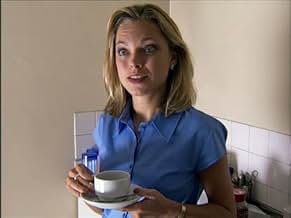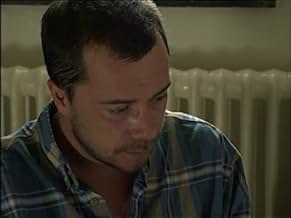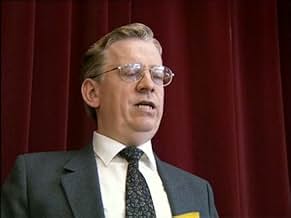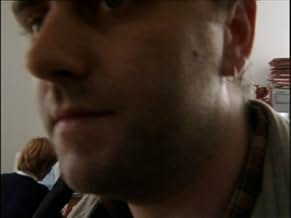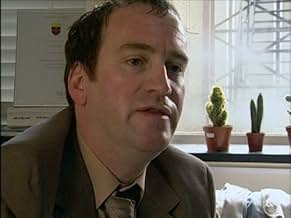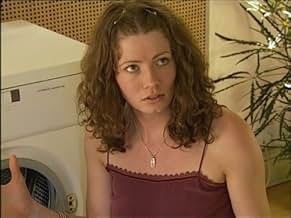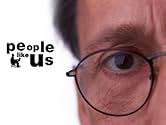Adicionar um enredo no seu idiomaOrdinary people's lives are documented in comic style by an off-screen narrator.Ordinary people's lives are documented in comic style by an off-screen narrator.Ordinary people's lives are documented in comic style by an off-screen narrator.
- Indicado para 1 prêmio BAFTA
- 2 vitórias e 2 indicações no total
Explorar episódios
Mark Hadfield
• 1999–2001
Mike Haley
• 1999–2001
Ewan Bailey
• 1999–2001
Iain Rogerson
• 1999–2001
Jilly Bond
• 1999
Beth Chalmers
• 2001
Colin Murphy
• 2001
David Roper
• 2001
Avaliações em destaque
I really love this sitcom. It´s a breath of fresh air from all those stupid moronic American trash proggies (with exception of Seinfeld, that is). For starters, there is no laugh track. Nobody laughs in the show. I simply love that. It´s great! You don´t hear those damn idiotic laughs that are crammed all over other sitcoms. Second, it´s filmed as a documentary. The basic premise is this guy, Roy Mallard, that walks around interviewing people at work. For example, a headmaster of a nice school, a freelance fotographer, people like that. So, in the beginning, every thing seems quite Unfunny, but then stupid things start to happen. People do mistakes, and funny things, altough they don´t even understand it. For instance, Roy is always saying "Hum" and "Hun hun" in order to advance in the interview. The show is excellent, and I really can´t describe accurately. You have to see it for yourself.
What appears to be a serious documentary about 'a day in the life' of some member of a profession (policeman, priest, bank manager etc.) is actually a very clever spoof of a documentary. If you listen carefully you realize that most of what the commentator is saying is gibberish and very funny. The commentator (Roy Mallard) is mostly off camera (except for the occasional hand when requested) and is a fine example of how not to do an interview. Some examples of his commentary 'X is 2 hours from London both by rail and train', 'It's 4pm and everybody has left school except for those who have stayed behind', 'It's 2 p.m. and already the Japanese are on time' and 'the world of financial money'. That's not all. The people whom he interviews are also prone to mangling the English language with many misstatements and misunderstandings. This is not the brash, crude humour that many Americans enjoy but more subtle and laid back. American humour tends overdo the one-liners in order to make sure the audience 'gets it'. This is the type of humour that has to be experienced more than once as it is very easy to miss the subtleties the first time around. Overall, an acquired taste, but much to my liking.
To give an example of the texture of People Like Us, here are the only two lines the actress playing a shoe-shop assistant in episode 5 has. All the other characters speak like this as well, only more so.
"You'll find that over time your feet will start to give with wear."
"Most people have at least one foot that's bigger than the other."
In the same episode, the announcer at a train station can be heard in the background droning po-facedly something like "This train stops at Berksley only, Hemperdon only, Staffordsly only, and Blackpool only."
From an episode set in a school; "Mr. Hensley's Problem-Solving club meets at lunchtime on the third floor, but you're not allowed to use the stairs."
These are only short examples from memory. The body of it, Roy Mallard's narration, relies on him going on so long like that that he forgets how he started the sentence.
You can buy some episodes of the radio series if you want a clearer example. Or look at the entry on radiohaha. That summarises it better than I can. Recommended for fans of On The Hour / The Day Today, although you probably know about it already.
"You'll find that over time your feet will start to give with wear."
"Most people have at least one foot that's bigger than the other."
In the same episode, the announcer at a train station can be heard in the background droning po-facedly something like "This train stops at Berksley only, Hemperdon only, Staffordsly only, and Blackpool only."
From an episode set in a school; "Mr. Hensley's Problem-Solving club meets at lunchtime on the third floor, but you're not allowed to use the stairs."
These are only short examples from memory. The body of it, Roy Mallard's narration, relies on him going on so long like that that he forgets how he started the sentence.
You can buy some episodes of the radio series if you want a clearer example. Or look at the entry on radiohaha. That summarises it better than I can. Recommended for fans of On The Hour / The Day Today, although you probably know about it already.
I caught this show on late-night PBS one time and I have made a point to watch several episodes since then. John Morton is a comedic genius! The comedy sort of reminds me of "Spinal Tap" with maybe a hint of "Curb Your Enthusiasm" - sort of subtle, and the more you watch it the funnier it gets.
Part of what makes it funny is the main character give a clinic on how NOT to make a documentary: he narrates at inappropriate times, gets too involved in the lives of his subjects when he should be just an observer, does a lot of bad editing, etc. Also, his subjects are so pathetic it's almost painful to watch. Beyond that, I can't really describe what's so funny about it - just watch one episode if you get the chance and you'll understand.
Part of what makes it funny is the main character give a clinic on how NOT to make a documentary: he narrates at inappropriate times, gets too involved in the lives of his subjects when he should be just an observer, does a lot of bad editing, etc. Also, his subjects are so pathetic it's almost painful to watch. Beyond that, I can't really describe what's so funny about it - just watch one episode if you get the chance and you'll understand.
Você sabia?
- CuriosidadesThough host Roy Mallard (voiced by Chris Langham) is never actually seen on-screen, a part of him will be seen in each episode, either a body-part or a reflection - a glass sliding door in episode 1.2, 'The Estate Agent', on the CCTV in 1.3 'The Police Officer' and in a shop window in episode 1.5, 'The Photographer' as well as seen briefly in a badly developed photo. In 1.4 'The Solicitor' his cheek and nose are seen when he spills his tea.
- Citações
Alison: This is going to be it now, isn't it?
Principais escolhas
Faça login para avaliar e ver a lista de recomendações personalizadas
- How many seasons does People Like Us have?Fornecido pela Alexa
Detalhes
Contribua para esta página
Sugerir uma alteração ou adicionar conteúdo ausente


